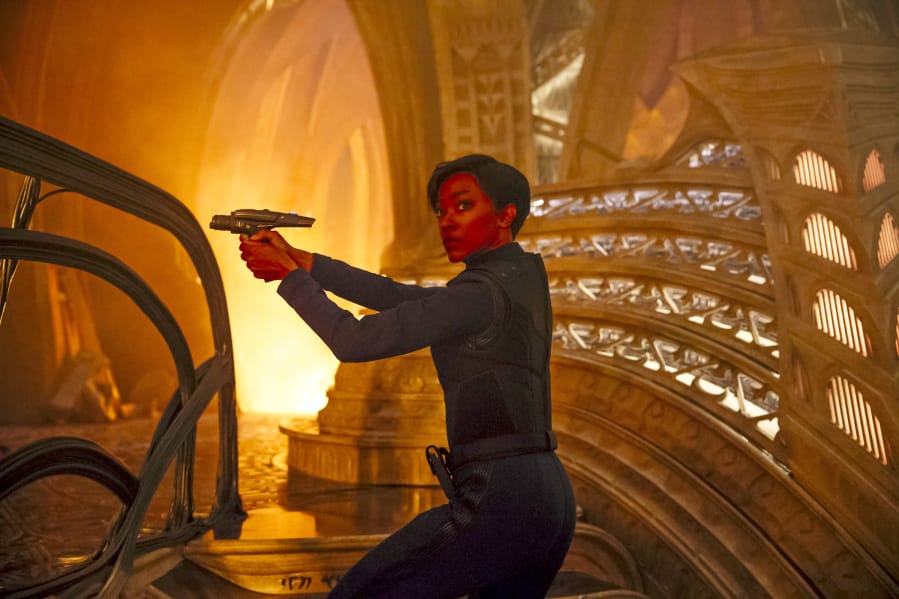While gazillionaires compete to launch the best private rockets, a space adventure has been conspicuously absent from this golden era of TV.
Today’s Earthlings have our choice of lavishly produced shows about almost anything you can imagine, set in almost any time period, including a number of deeply dystopian stories about the future.
Instead of outer space, TV has spent the past decade obsessing over inner space, the Philip K. Dick stuff, over and over.
It’s all about the search for the true self amid the tangle of technology. “Westworld,” “Altered Carbon,” “Black Mirror,” “Legion,” “Mr. Robot,” “The Leftovers”: Our signature genre is existential dread, expressed in lines of code.
The notion of producing a really great, high-end space drama — something as good or better than HBO’s “Game of Thrones,” only set among stars — must sound to network executives as cost-prohibitive and failure-prone as most NASA proposals sound to lawmakers. In either context, space is a huge investment of time and money. It’s a genre even the most profligate networks are content to leave to deep-pocketed film studios, which rely solely on proven franchises.
Only lately, as the race to dominate streaming content continues, have the networks started looking for an original, live-action space drama. HBO this month outbid Apple TV for J.J. Abrams’ latest idea, currently titled “Demimonde,” that is reportedly about “a world’s battle against a monstrous, oppressive force.” Closer to realization, Hulu is making “House of Cards” creator Beau Willimon’s “The First,” a drama about a manned mission to Mars, starring Sean Penn.
For years, TV took its cue from old “Flash Gordon” serials, scratching its space and sci-fi itch on the cheap. With the Space Age came “Lost in Space” and Gene Roddenberry’s pure, primordial “Star Trek,” starring William Shatner and Leonard Nimoy.
Spirit and verve made up for the shoddy effects. Such shows were aimed at kids, but the real fans turned out to be subsequent generations of high-IQ adults — the nitpickiest, quibbliest, hardest-to-please, ravenously excitable and most loyal fans ever.
It’s been a long, lonely time since then. Syfy still delivers the occasional space-set series, but they usually lack a compelling reason to stick around.
You say: All right, smarty-pants. Here’s a legal pad and a pen. Come up with your so-called “Game of Thrones”-in-space on a sustainable, TV-series production schedule and budget.
The further you search, the more it becomes clear: Television only ever had one space saga that truly felt at home in the medium. It’s set in a distant yet palpable future in which Earthlings and others have formed an altruistic ideal of mutual respect and exploration — a Federation of planets.
Yes, all roads eventually lead back to Roddenberry.
“Star Trek: Discovery,” Bryan Fuller and Alex Kurtzman’s gripping and clever revival of the brand, wraps up its first streaming season tonight on CBS All Access. As good as the show is, it carries with it some unique burdens. Not only must it please fans, it also has to be a “Star Trek” that can compete in the peak-TV era — while persuading viewers to pay for another new streaming subscription service ($5.99 a month). It made some of us wish “Star Trek: Discovery” would be a big dud.
And it seemed we might get our wish. With a list of producers and writers as long as a CVS receipt, “Discovery” premiered on the main network as a free sample with a hurried, confusing and poorly executed pilot that lacked “Star Trek’s” usual instincts for character and pace.
“Discovery,” which takes place a decade before the original “Star Trek” series, introduces us first to its complicated protagonist, an anti-hero named Michael Burnham (Sonequa Martin-Green), a strident and cocky first officer aboard the USS Shenzou.
Orphaned as a child and raised by Vulcan ambassador Sarek (James Frain), Burnham is urged by her mentor, Capt. Philippa Georgiou (Michelle Yeoh), to reconcile her logic-driven personality with her human side. In an encounter with a dormant tribe of xenophobic Klingons, Burnham takes actions that start a war between the Federation and the Klingons, destroying the Shenzou and costing thousands of lives — including Georgiou’s. Sentenced to prison for treason, Burnham instead winds up as an ostracized temp on the USS Discovery.
To know much more than this, a viewer would have had to follow “Star Trek: Discovery” over its paywall, where, by the third episode (spoiler alerts, ahoy), it becomes a far more thoughtful and original addition to the “Trek” universe — and yes, worth subscribing to.
The big secret aboard Discovery, it turns out, is a new kind of interstellar travel that chief engineer and science offer Paul Stamets (Anthony Rapp) has harnessed using teeny-tiny space fungi to transport a starship from one end of the galaxy to the other in a snap.
The ludicrousness of the concept pushes past “Star Trek’s” usual respect for plausible science, and the middle episodes drift into the procedural-adventure style of the older shows, in which planets are visited, encounters are made, and time is desperately running out to mend some momentary, life-threatening crisis. It’s worth nothing that, late in the season, a character whom viewers can’t help but like is revealed to be the ultimate impostor. Anyone who saw it had plenty to say about it, but how many people might never see it?
If CBS had been smart enough to air “Star Trek: Discovery” on plain ol’ TV, the show’s plot twists and big reveals probably would have been quite the talkers.
And yet, as capable as it turned out to be, “Star Trek: Discovery” has only satisfied part of the deeper longing. It’s like staring up at the nighttime sky, wishing for a fantastic space drama among all the possibilities, and someone keeps pointing out the same point of light that is “Star Trek.”
Is that all there is? Are we really this alone?



